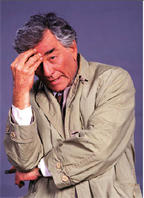Vicarious Emotions in Entertainment

Communications researchers speak of “parasocial relationships” — the emotionally-loaded bonds that people sometimes form with fictional characters. Sometimes it’s the hero of a novel, sometimes the glamorous heroine of an opera, sometimes perhaps even a cigar-smoking, raincoat-wearing detective called Colombo, for whom the viewer develops an abiding fondness. The thing is, we feel for these people as if they were our real friends. When it comes to soap operas, viewers often develop what can only be called an “addiction” to certain shows. If they miss a day, they have to get caught up. If the show goes off the air, they mourn as if they’d lost real loved ones. In fact, parasocial relationship may be among the most intense relationships of one’s life.
People don’t necessarily disclose their parasocial relationships, lest they be ridiculed for them. They know what others think about all this: “Get a life!” It is often supposed that people form emotional bonds with the characters in stories only as a substitute for real life, and only because they lack suitable persons to love. It is neurotic loners who supposedly form these ersatz bonds, and only because they are reluctant to open themselves up to the give-and-take intimacy of authentic human attachment.
Not so. Psychologists who study parasocial life say that it is not pursued by people who shy away from reality or strong emotional bonds. On the contrary, the people who form rich relationships in general also form rich relationships with fictitious people, living vicariously by typically empathizing with whomever they meet. People who are stand-offish in real life are also stand-offish toward fictional characters, observing them with detachment instead of empathy.
Empathy makes you feel what the other person is experiencing — or at least feel for the other person. It can be unpleasant. For example, I won’t go to watch trapeze performers. Presumably they personally feel no anxiety, but I feel it for them. In fact, I hate the stress, and I won’t put myself through it. My life has adequate stress and I don’t want more — but apparently some people do. They pay to experience vicarious misery and danger. Usually, the people who enjoy watching stressful films are the same people who participate in extreme sports or other forms of real stress as recreation. On their days off, most emergency room physicians rappel down cliffs or scuba dive for fun. The vicarious thrills derived from watching horror movies or Clint Eastwood flicks may be too pale to satisfy them, though they are too intense for me.
Our emotions are physiologically the same, whether we get them from real-life adventures or vicariously from a movie or TV screen. Adrenaline is adrenaline, and you may even produce it in greater quantities when watching a cliffhanger film than when hanging off a cliff yourself.
The effects of adrenaline are known and, for the most part, are detrimental to one’s health. Far be it from me to advise you against watching Jaws, if that’s what you enjoy, but it’s not good for your cardiovascular system. There’s research showing that emotional stress, unlike the stress of physical exertion, harms the lining of blood vessels. In the case of an audience watching the opening battle scene in Saving Private Ryan it diminished their reactivity by 35 percent.
Laughter and love, on the other hand, do you a world of good. Laughter is indeed “good medicine.” Loving other people — or even pets (and, who knows, maybe even African violets)— will make you healthier and help you live longer. If you don’t feel love in your chest several times a day, you should consider renting a sweet movie. Pick one about people who are basically good and who do experience love. By empathizing with them you’ll generate some excellent peptides and hormones, including perhaps oxytocin itself, the nicest chemical your body produces in tender, affectionate social relationships. Let yourself enjoy it. Get into the spirit of it. Empathize!



0 Comments:
Post a Comment
<< Home